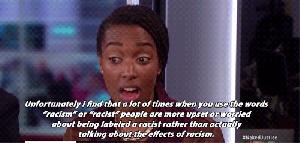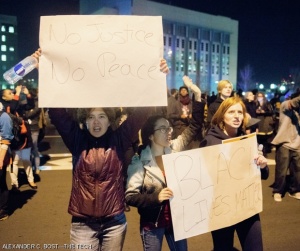But I wanted to come on to say
Happy New Year's!
I'll be back to posting soon, I think.

Mthembu highlighted the need to engage in open dialogue about race, despite the potential discomfort. [...] In order to have these vital conversations, Mthembu explained, “We have to allow for mistakes and forgive each other.” (MIT Black Lives Matter event)
 Jenny Holzer, My arrogance knows no bounds and I will make no peace today, and you should be so lucky to find a woman like me[/caption]
Jenny Holzer, My arrogance knows no bounds and I will make no peace today, and you should be so lucky to find a woman like me[/caption]Imagine our Amazonian future. Enjoy your vision, visage, victories. Know that loving yourself as a woman – connecting with our history – exploring our witches’ strength and creativity – know that this like all women’s work is real. (via Aria)
 It me![/caption]
It me![/caption]People who are protesting should actually learn about about the situation and how rioting might not get them anywhere but cause more aggravation and riots itself
I'm sorry, but i think it's a little far to claim that it is a "burden" to be black in America.
1000s of lives, homes, and property have been destroyed in these riots! how terrible
Chief O’Neill said the protesters [in NYC] had not prevented ambulances or other official vehicles from responding to emergencies during the first two nights of demonstrations. No sick person, or civilian with a health emergency has been unable to get help, he said. (via Ny Times)
Police fired tear gas at a crowd of protesters who were carrying an apparently unconscious woman to safety during violent clashes in Ferguson on Monday night. (Daily Mail)
A short time later, Brown's family issued a statement asking people to keep their protests peaceful (via Fox News, Fires & Looting)

1 As news of the decision spread, protesters surged forward, throwing objects at officers in riot gear. The sound of gunfire could be heard. 2 Police officers used tear gas and smoke to disperse people who were hurling rocks and breaking the windows of parked police cruisers. A vehicle was set on fire.3 At least a dozen buildings were set on fire around the city, many in the vicinity of Ferguson Market and Liquor, the store Michael Brown was in before he was killed by Officer Wilson. (via Ny Times)
At around 1 a.m., the white mob began setting fires, mainly in businesses on commercial Archer Street at the southern edge of the Greenwood district. (via Wikipedia)
Officers responded by firing what authorities said was smoke and pepper spray into the crowd. St. Louis County Police later confirmed tear gas also was used. (Fox News)
To counter the crowds, local police have attempted to use the same techniques that security forces use around the world, including tear gas, bean bag rounds and wooden bullets. [...] In Ferguson, MO, police have attempted to disperse protesters using smoke bombs – fireworks that generate smoke after ignition. (Al Jazeera)
Although modern smoke grenades are designed not to directly emit fire or sparks, they remain a fire hazard (Wikipedia)
A report distributed today by an Idaho State Fire Marshall shows that tear gas was the source of a house fire on July 12, 2006. The canister first ignited the fabric covering and foam cushions of a couch in the residence (KHQ)
The Rosewood Massacre was a racially motivated attack on African Americans and their neighborhood committed by a white mob in Florida during January 1–7, 1923. The town of Rosewood, a majority-black community, was abandoned and destroyed in what contemporary news reports characterized as a race riot (with the implication blacks had broken out in violence (Wikipidea)
It’s depressing that we’re still dealing with these issues, but most of us are on the right side of history. Most of us. (Vanity fair)
[Stop] the senseless killing of young black voters across the United States by law enforcement. (Hands up united)
At a minimum, a feminist theory of agency must explain how it is possible for women in male-dominated societies to live in ways that reflect their genuine needs and concerns, and it must explain how it is possible for women to develop critiques of sexist social and political institutions and to mount active resistance. Moreover, it must accomplish both of those tasks without pretending that people are capable of stepping outside their own socially determined viewpoints to attain a God-like perspective. (via britannica)
Agency requires a well-developed repertoire of skills in self-discovery, self-definition, and self-direction.(via britannica)
There is no denying that there exist dispositions to resist; and one of the tasks of sociology is precisely to examine under what conditions these dispositions are socially constituted, effectively triggered, and rendered politically efficient. [...] Often forget that the dominated seldom escape the antinomy of domination. for example to oppose the school system, in the manner of the British working class 'lads' analyzed by Willis (1997), through horseplay, truancy, and delinquency, is to exclude oneself from school, and, increasingly to lock oneself into one's condition of dominated. On the contrary, to accept assimilation by adopting school culture accounts to being coopted by the institution. The dominated are very often condemned to such dilemmas, to choices between two solutions which, each from a certain standpoint, are equally bad ones (the same applies, in a sense, to women or to stigmatized minorities) (via The Purpose of Reflexive Sociology, Pierre Bourdieu and Loic J.D. Wacquant)
I do not see how relations of domination, whether material or symbolic, could possibly operate without implying, activating resistance. The dominated, in any social universe, can always exert a certain force, in as much as belong to a field means by definition that one is capable of producing effects in it (if only elicit reactions of exclusion on the part of those who occupy its dominant position). (via The Purpose of Reflexive Sociology, Pierre Bourdieu and Loic J.D. Wacquant)
I'm talking about when you put your body and your mind on the line and commit yourself to years of struggle in order to change the society in which you live. (Andrea Dworkin, via DGR)
At a minimum, a feminist theory of agency must explain how it is possible for women in male-dominated societies to live in ways that reflect their genuine needs and concerns, and it must explain how it is possible for women to develop critiques of sexist social and political institutions and to mount active resistance. Moreover, it must accomplish both of those tasks without pretending that people are capable of stepping outside their own socially determined viewpoints to attain a God-like perspective. (via britannica)
Agency requires a well-developed repertoire of skills in self-discovery, self-definition, and self-direction.(via britannica)
There is no denying that there exist dispositions to resist; and one of the tasks of sociology is precisely to examine under what conditions these dispositions are socially constituted, effectively triggered, and rendered politically efficient. [...] Often forget that the dominated seldom escape the antinomy of domination. for example to oppose the school system, in the manner of the British working class 'lads' analyzed by Willis (1997), through horseplay, truancy, and delinquency, is to exclude oneself from school, and, increasingly to lock oneself into one's condition of dominated. On the contrary, to accept assimilation by adopting school culture accounts to being coopted by the institution. The dominated are very often condemned to such dilemmas, to choices between two solutions which, each from a certain standpoint, are equally bad ones (the same applies, in a sense, to women or to stigmatized minorities) (via The Purpose of Reflexive Sociology, Pierre Bourdieu and Loic J.D. Wacquant)
But it is seeming to me that race (together with racism and race privilege) is apparently constructed as something inescapable. And it makes sense that it would be, since such a construction would best serve those served by race and racism. Of course race and racism are impossible to escape; of course a white person is always in a sticky web of privilege that permits only acts which reinforce ("reinscribe") racism. This just means that some exit must be forced. That will require conceptual creativity, and perhaps conceptual violence. (via White woman feminist at Feminist Reprise)
I do not see how relations of domination, whether material or symbolic, could possibly operate without implying, activating resistance. The dominated, in any social universe, can always exert a certain force, in as much as belong to a field means by definition that one is capable of producing effects in it (if only elicit reactions of exclusion on the part of those who occupy its dominant position). (via The Purpose of Reflexive Sociology, Pierre Bourdieu and Loic J.D. Wacquant)
I'm talking about when you put your body and your mind on the line and commit yourself to years of struggle in order to change the society in which you live. (Andrea Dworkin, via DGR)